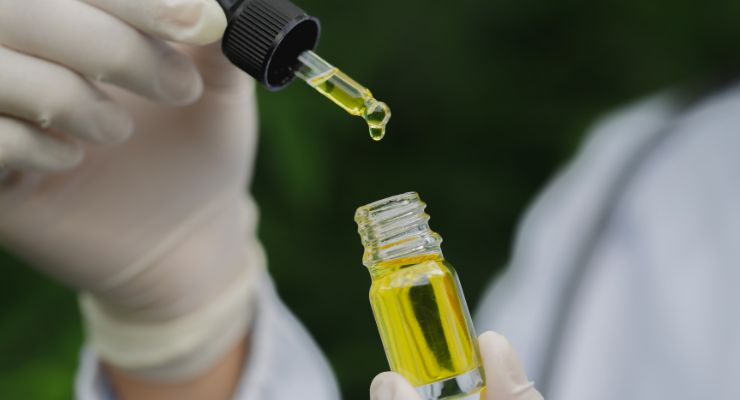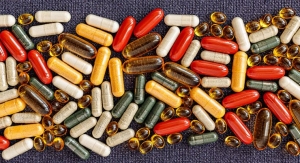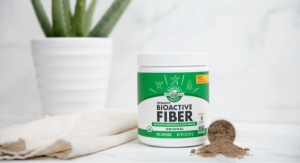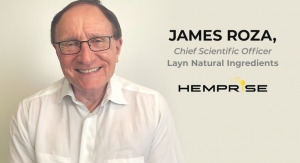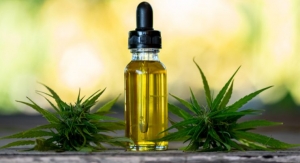By Sheldon Baker, Baker Dillon / Area Code 42002.09.23
Blake Ebersole is president and founder of NaturPro Scientific, LLC, providing essential seed-to-shelf guidance for innovation, R&D, quality assurance and regulatory compliance of natural products in the supplement, food, and cannabis industries. He participates on several active technical committees and expert panels, including the American Herbal Products Association, ASTM International, AOAC International and the U.S. Hemp Roundtable.
Area Code 420 (AC 420): What is the state of the CBD category today?
Ebersole: The CBD category continues to be a riddle of an enigma. In the U.S., it grew at an incredible clip, and then suffered an equally precipitous fall. But some firms have also benefited from the amount of flexibility and freedom that the lack of regulation and enforcement allows.
From a purely business aspect, the oversupply of CBD after falling demand was able to be converted into delta-8 THC, which has enjoyed immense popularity across the U.S. in states where cannabis is still prohibited, for better or worse. Despite numerous concerns about safety and quality, delta-8 has surely saved many jobs at manufacturers and retailers who would have otherwise gone under. While I agree with many industry groups that delta-8 should not be allowed, it's hard to blame firms for trying to keep afloat when we all expected more clarity on CBD at this point.
AC 420: Were you surprised by the FDA's recent decision regarding CBD?
Ebersole: I was not surprised by FDA's recent decision (or non-decision) about CBD products. Years of waffling ultimately failed thousands of farmers and small business owners and millions of consumers before FDA's recent communication. It was even more disappointing considering all the investments made in studying the safety of CBD and hemp in recent years.
The positive side is that we currently have more safety data on CBD than for many of our well-established dietary ingredients. So we would normally expect this level of data to support a successful GRAS (Generally Recognized As Safe) or NDI (New Dietary Ingredient) assessment of CBD at the lower doses being used in supplement products.
Unfortunately, FDA keeps conflating the higher doses of CBD drugs studied with the lower doses, which is extremely confusing to me. So, although the recent Reagan-Udall report that exposed FDA's systemic issues did not specifically cover CBD or supplements, it did partially explain FDA's ineptitude on CBD.
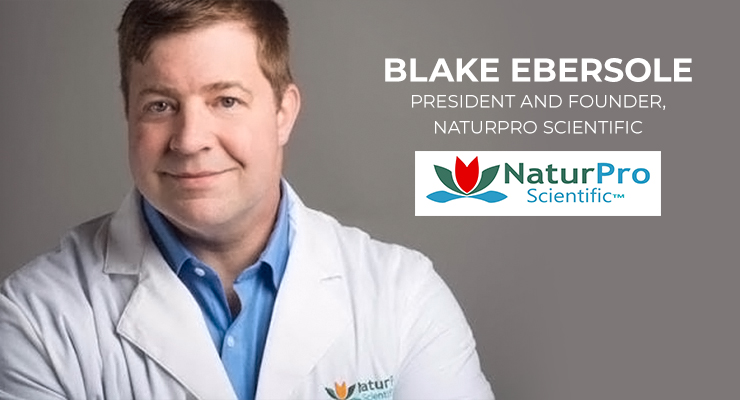
Ebersole: The answer to this question depends on what will happen at the federal level. Certainly, there are reputable CBD brands like Charlotte's Web doing the right things. But for every high-quality brand, there may be tens or even hundreds of cottage brands still operating without adequate GMPs (Good Manufacturing Practices).
Further, the promise and potential of CBD has suffered to a degree from the bad reputation and marketing of other cannabinoids like delta-8 THC, that don't have the same track record of safety and use. Realistically, as retailers and manufacturers continue to improve their quality assurance and become better at self-regulation, we should expect a certain amount of shelf space dedicated to hemp and CBD products for the long term.
For example, major pharmacies like CVS and Walgreens currently stock CBD cosmetic products, and they seem ready to add CBD to their supplement section when the purple haze clears from the federal hotbox.
AC 420: If you had a magic wand you could wave over the CBD industry, what change would you make?
Ebersole: My wand is less magic than simply common sense: federal acceptance of CBD within the existing regulatory paths already traveled by other botanical dietary ingredients and food additives. When everyone can finally accept that cannabis is just another regulated botanical, and CBD another regulated dietary ingredient, then we're closer to an industry that everyone expected. One that is fair and just, with access to safe and useful CBD products.
AC 420: What services does NaturPro Scientific offer CBD manufacturers?
Ebersole: NaturPro has been working in the CBD and cannabis industry since 2015 on both the product development and quality and regulatory fronts because they ultimately go hand in hand. We've advised hundreds of firms in one capacity or another—usually with a cautionary tale or two, to balance out the hype.
Our aim has always been to treat our clients' businesses like we would our own, to tell the honest and unvarnished truth, and help our clients succeed while avoiding the numerous pitfalls of the industry.
Ebersole: Anxiety is integral to the human condition. In today's connected world, we're experiencing more and more of it as we doom scroll through our social feeds. Growing up, I identified cannabis much like "soma" from Huxley's Brave New World, a temporary remedy from the mild boredom and anxiety of daily life for everyday citizens.
I've always thought that cannabis, if used in moderation and with care and guidance, can be a safe substitute for some of the greater harms like alcohol and hard drugs. But like many things in life, there's likely downsides of cannabis, at least for some people. Chronic or heavy use by certain people, including people with severe anxiety disorders or schizophrenia, is probably not a good idea without competent medical supervision.
In an ideal world, cannabis would be prescribed by and openly discussed with one's physician as part of a comprehensive health plan, and not hidden from plain view from one's physician. Some countries have caught on to the opportunity to study and adopt cannabis as part of their conventional medical treatment. The U.S. is a little behind this movement, although I have hope that we're starting to move in the right direction.
AC 420: What is the best piece of wisdom you have been given, and by whom?
Ebersole: I was lucky to work for my dad in the restaurant business growing up. One of the many things he repeated was that reality is perception, and there's always more than one side to a story. So, when we seek the truth, we always must keep an open mind and question our own perception of reality. It wasn't until much later I learned about the Dunning-Kruger effect that the more we think we know, the less we know. But to this day, I continue to question facts and assumptions even when I think I'm confident in the answer.
About the Author: Sheldon Baker is CEO of the Baker Dillon Group LLC and has created numerous nutraceutical brand marketing communications and public relations campaigns for many well-known supplement and food industry companies. For interview consideration or brand marketing consulting, contact him at Contact@The420AreaCode.com.
Area Code 420 (AC 420): What is the state of the CBD category today?
Ebersole: The CBD category continues to be a riddle of an enigma. In the U.S., it grew at an incredible clip, and then suffered an equally precipitous fall. But some firms have also benefited from the amount of flexibility and freedom that the lack of regulation and enforcement allows.
From a purely business aspect, the oversupply of CBD after falling demand was able to be converted into delta-8 THC, which has enjoyed immense popularity across the U.S. in states where cannabis is still prohibited, for better or worse. Despite numerous concerns about safety and quality, delta-8 has surely saved many jobs at manufacturers and retailers who would have otherwise gone under. While I agree with many industry groups that delta-8 should not be allowed, it's hard to blame firms for trying to keep afloat when we all expected more clarity on CBD at this point.
AC 420: Were you surprised by the FDA's recent decision regarding CBD?
Ebersole: I was not surprised by FDA's recent decision (or non-decision) about CBD products. Years of waffling ultimately failed thousands of farmers and small business owners and millions of consumers before FDA's recent communication. It was even more disappointing considering all the investments made in studying the safety of CBD and hemp in recent years.
The positive side is that we currently have more safety data on CBD than for many of our well-established dietary ingredients. So we would normally expect this level of data to support a successful GRAS (Generally Recognized As Safe) or NDI (New Dietary Ingredient) assessment of CBD at the lower doses being used in supplement products.
Unfortunately, FDA keeps conflating the higher doses of CBD drugs studied with the lower doses, which is extremely confusing to me. So, although the recent Reagan-Udall report that exposed FDA's systemic issues did not specifically cover CBD or supplements, it did partially explain FDA's ineptitude on CBD.

CBD Expectations
AC 420: How do you envision CBD continuing to play an important role in the supplement industry?Ebersole: The answer to this question depends on what will happen at the federal level. Certainly, there are reputable CBD brands like Charlotte's Web doing the right things. But for every high-quality brand, there may be tens or even hundreds of cottage brands still operating without adequate GMPs (Good Manufacturing Practices).
Further, the promise and potential of CBD has suffered to a degree from the bad reputation and marketing of other cannabinoids like delta-8 THC, that don't have the same track record of safety and use. Realistically, as retailers and manufacturers continue to improve their quality assurance and become better at self-regulation, we should expect a certain amount of shelf space dedicated to hemp and CBD products for the long term.
For example, major pharmacies like CVS and Walgreens currently stock CBD cosmetic products, and they seem ready to add CBD to their supplement section when the purple haze clears from the federal hotbox.
AC 420: If you had a magic wand you could wave over the CBD industry, what change would you make?
Ebersole: My wand is less magic than simply common sense: federal acceptance of CBD within the existing regulatory paths already traveled by other botanical dietary ingredients and food additives. When everyone can finally accept that cannabis is just another regulated botanical, and CBD another regulated dietary ingredient, then we're closer to an industry that everyone expected. One that is fair and just, with access to safe and useful CBD products.
AC 420: What services does NaturPro Scientific offer CBD manufacturers?
Ebersole: NaturPro has been working in the CBD and cannabis industry since 2015 on both the product development and quality and regulatory fronts because they ultimately go hand in hand. We've advised hundreds of firms in one capacity or another—usually with a cautionary tale or two, to balance out the hype.
Our aim has always been to treat our clients' businesses like we would our own, to tell the honest and unvarnished truth, and help our clients succeed while avoiding the numerous pitfalls of the industry.
Cannabis in Conventional Medicine
AC 420: Interesting how anxiety came to dominate the big business of medical cannabis. Your thoughts.Ebersole: Anxiety is integral to the human condition. In today's connected world, we're experiencing more and more of it as we doom scroll through our social feeds. Growing up, I identified cannabis much like "soma" from Huxley's Brave New World, a temporary remedy from the mild boredom and anxiety of daily life for everyday citizens.
I've always thought that cannabis, if used in moderation and with care and guidance, can be a safe substitute for some of the greater harms like alcohol and hard drugs. But like many things in life, there's likely downsides of cannabis, at least for some people. Chronic or heavy use by certain people, including people with severe anxiety disorders or schizophrenia, is probably not a good idea without competent medical supervision.
In an ideal world, cannabis would be prescribed by and openly discussed with one's physician as part of a comprehensive health plan, and not hidden from plain view from one's physician. Some countries have caught on to the opportunity to study and adopt cannabis as part of their conventional medical treatment. The U.S. is a little behind this movement, although I have hope that we're starting to move in the right direction.
AC 420: What is the best piece of wisdom you have been given, and by whom?
Ebersole: I was lucky to work for my dad in the restaurant business growing up. One of the many things he repeated was that reality is perception, and there's always more than one side to a story. So, when we seek the truth, we always must keep an open mind and question our own perception of reality. It wasn't until much later I learned about the Dunning-Kruger effect that the more we think we know, the less we know. But to this day, I continue to question facts and assumptions even when I think I'm confident in the answer.
About the Author: Sheldon Baker is CEO of the Baker Dillon Group LLC and has created numerous nutraceutical brand marketing communications and public relations campaigns for many well-known supplement and food industry companies. For interview consideration or brand marketing consulting, contact him at Contact@The420AreaCode.com.

